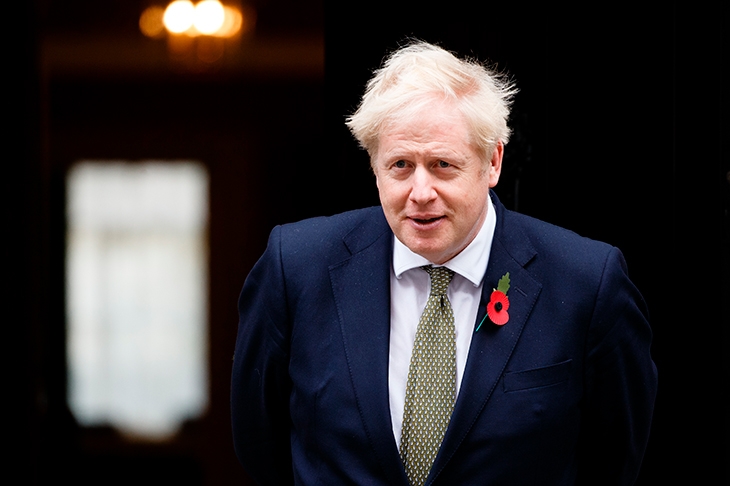A few days ago, I came across a group of Tory MPs in a House of Commons corridor looking rather perplexed. It soon became apparent why. They had been discussing the government’s myriad problems and expressing their concerns about how things were being handled by Downing Street. Then their phones had pinged with news of a poll that showed the Tories moving into a six-point lead.
To be sure, not all the polls are this favourable to the Conservative party: one at the weekend had Labour two points ahead. There is also an argument that it’s not useful to look at voting intentions so far away from the next general election, and that a much more valuable question to indicate where public political mood is going is: ‘Which of the leaders do you think would make the best prime minister?’
But there is no getting away from the fact that, on average, the Tories are maintaining a narrow lead in the polls despite a series of ‘worst weeks’ for the government that have left even cabinet ministers puzzled at Downing Street’s political judgments. One Secretary of State describes the row over free school meals as ‘blindingly obvious’ and fumes that the government has to sort out the situation before the end of term, if it is to avoid being portrayed as Scrooge letting Tiny Tim go hungry over Christmas.

One long-serving figure in government thinks that the situation in the polls reflects the fact that ‘“Brenda from Bristol” has gone from being a reaction to elections, to a general reaction to politics’. Brenda from Bristol was, of course, the member of the public who responded to a journalist’s question about Theresa May’s announcement of the 2017 snap election by saying: ‘Not another one… there’s too much politics going on at the moment.’ Her reaction went viral and captured something the polls could not: that the public would not thank Mrs May for making them go and vote again.
Now voters want to tune out politics altogether. They just want it all to go away. The Tories’ success in last year’s general election was, in part, because of their ability to understand this sentiment. This explains the potency of their pledge that a Conservative majority government would ‘get Brexit done’ and ‘stop the arguing’.
One pollster who has been conducting focus groups throughout the pandemic says that there is no patience for politicking. Voters aren’t particularly interested in what the opposition parties have to say about how to handle the virus. This is why Keir Starmer’s proposal for a ‘circuit breaker’, in effect a two-week national lockdown, hasn’t had the cut-through many expected. What voters want is leadership. But they also feel that they aren’t getting that from the government. Hence the stasis in the polls, with neither a rally-round-the-flag effect nor a decisive shift to the opposition.
Voters can’t tune out what the government is doing on Covid the way they could regarding, say, Brexit
Another pollster tells me ‘you would be surprised at how much slack is still being given to the government’ by voters. One of the most striking findings of the recent Britain’s Choice report by the More in Common foundation is that while 60 per cent of voters think the government’s response to Covid has been incompetent, a majority also believe that it has been fair. Indeed, of the seven countries surveyed, Britain is the only one where people think that of their government.
As long as Covid is in the headlines, almost no other issue will break through. It is a relatively rare situation where political decisions affect everyone’s everyday life. Voters simply can’t tune out what the government is doing on Covid in the way that they could regarding, say, the Brexit rows during the last parliament, since the restrictions change how nearly everyone lives.
The question then becomes: how will the public feel at the end of this crisis? One immediate problem for the government — highlighted by the row over free school meals in the holidays — is that people resent having things taken away from them. It will be very politically challenging when the government has to roll back all the emergency financial support that has been put in place during the pandemic, particularly as there won’t be any grand, definitive ‘Victory over Covid’ day. Rather there will be a gradual return to normal as testing, therapeutics and then, with any luck, a vaccine begin to make a difference. Many people will feel that support should continue until the economy returns to its pre-Covid ways. But the painful truth is that there will almost certainly be permanent adjustments to the economy because of this crisis.
Perhaps the greater challenge for the Tories, though, is how to keep in touch with the spirit of the times. One would normally expect an event like this to move politics in a collectivist direction. In terms of interventions in the economy and restrictions on liberty, the response to Covid has not been unlike a war of national survival. In the last century the two world wars created the modern welfare state, and it is easy to see how Covid could create a permanently larger state, especially since the virus is highlighting inequalities that already existed in this country. The question for the Tories is how to come up with authentically centre-right solutions to these problems: how do they avoid being dragged into a debate about ever-higher spending that they will never be able to win? They need a vision for ‘levelling up’ that is about increasing productivity in deprived regions, not just building new schools and hospitals.
Even once the pandemic has passed, voters won’t be in the mood for political argy-bargy. Tellingly, in the US, Barack Obama — who in 2008 was exhorting people to join a great movement that would change America — is now arguing that one benefit of voting for Joe Biden and Kamala Harris is that ‘you won’t have to think about them every single day. There might be a whole day where they won’t be on TV. There might be a whole day where they don’t tweet some craziness. You won’t have to argue about them every day. It won’t be so exhausting, just having a normal president’. On both sides of the Atlantic, the drama of the past few years has left people exhausted and craving a period of calm.







Comments